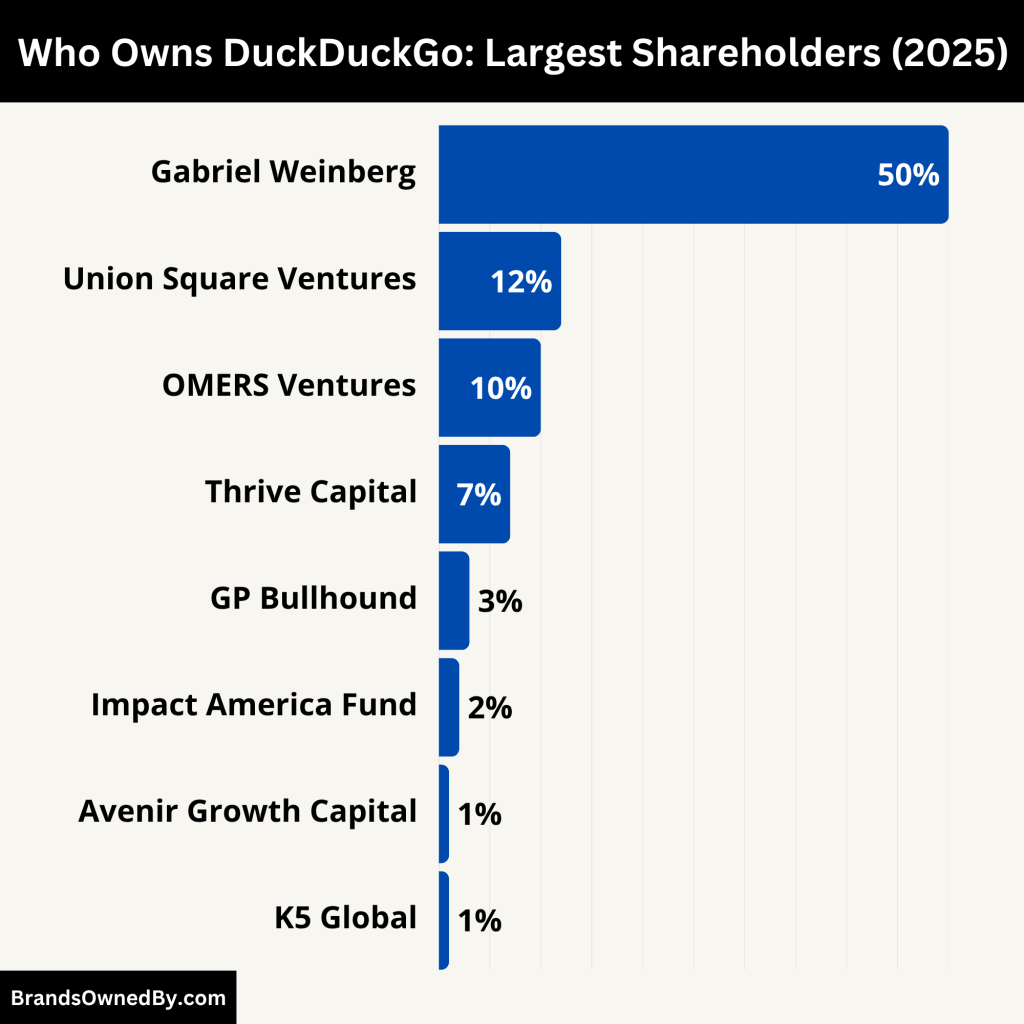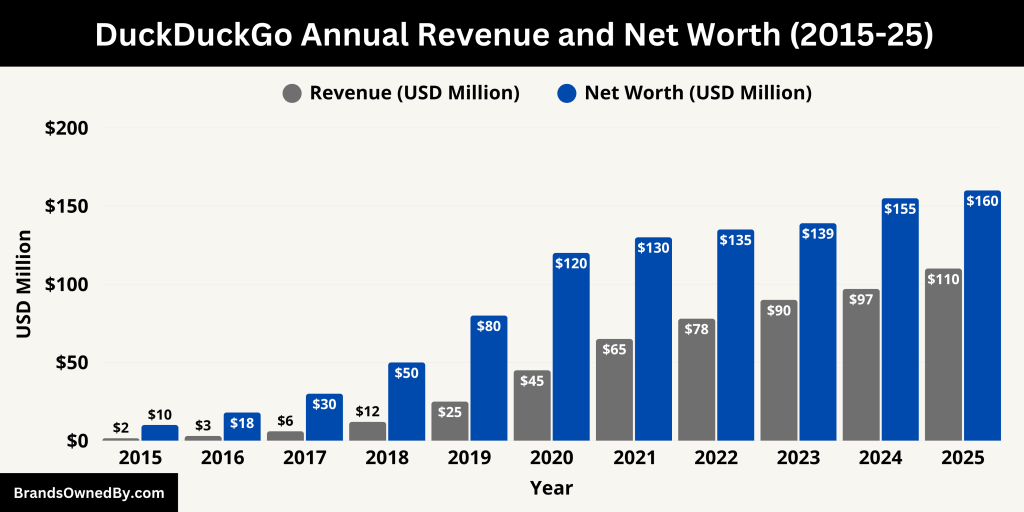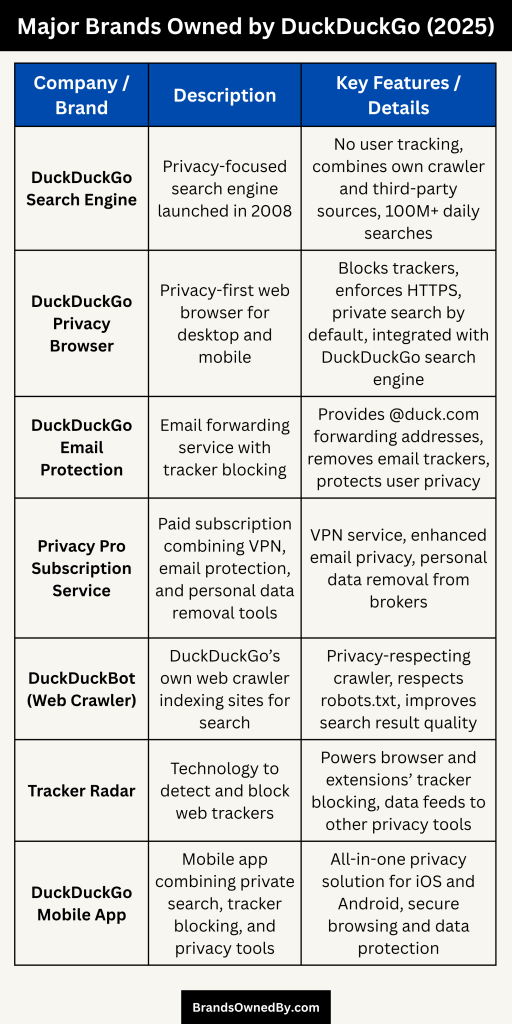DuckDuckGo is one of the most popular private search engines. Many users often ask, “who owns DuckDuckGo?” because of its strong privacy claims and unique stance against data tracking. Here’s a detailed look at the company’s ownership, leadership, and financials.
DuckDuckGo Company Profile
DuckDuckGo is a privacy-focused internet company best known for its search engine, which does not track users or store personal data. Its goal is to offer a safer, more private alternative to traditional search engines like Google. The company’s services include a private search engine, privacy browser apps, email protection, and tracker-blocking tools. DuckDuckGo stands out in the tech industry for making privacy accessible to everyone.
The company operates under the principle of “simple privacy protection.” Unlike most tech firms that rely on tracking-based advertising, DuckDuckGo shows contextual ads based on keywords, not user behavior. This commitment to privacy has helped it grow a loyal user base globally.
Founders of DuckDuckGo
DuckDuckGo was founded by Gabriel Weinberg in 2008. Weinberg is an entrepreneur and software engineer who previously created Names Database, which was sold to United Online in 2006.
Weinberg launched DuckDuckGo with his own funds and bootstrapped the company for several years before accepting outside investment. His vision was to create a search engine that offered useful results without invading user privacy. He remains the CEO and a key driving force behind the company’s mission and product development.
Major Milestones
Here are some of DuckDuckGo’s key milestones since its founding:
- 2008: DuckDuckGo was officially launched.
- 2010: Introduced instant answers and open-source community features.
- 2011: Billboards promoting DuckDuckGo’s privacy message went up in San Francisco and other U.S. cities.
- 2013: Search traffic rose sharply following the Edward Snowden revelations about mass surveillance.
- 2014: Apple added DuckDuckGo as a default search option in Safari.
- 2015: Mozilla Firefox included DuckDuckGo as a built-in search engine.
- 2018: Reached 30 million searches per day and launched its mobile browser and tracker blocker.
- 2021: Exceeded 100 million daily searches for the first time.
- 2022: Launched DuckDuckGo Email Protection and expanded browser extensions.
Company Details
- Company Name: DuckDuckGo, Inc.
- Headquarters: Paoli, Pennsylvania, United States
- Founded: 2008
- Founder and CEO: Gabriel Weinberg
- Type: Private company (not publicly traded)
- Industry: Internet, Search Engine, Online Privacy
- Core Products: Private search engine, mobile browser, desktop extension, email protection
- Monetization Model: Contextual ads (powered by Microsoft) and affiliate partnerships
- Employees: The team is fully remote, with under 200 employees as of the latest available estimates
- Privacy Focus: No user tracking, no personal data stored, transparent privacy practices.
Who Owns DuckDuckGo: List of Shareholders

DuckDuckGo is a privately held company. It has raised about $113 million over several funding rounds. While exact ownership percentages are not publicly disclosed, estimates based on typical equity dilution patterns and disclosed funding participation give us a good view of the likely ownership structure.
Below is a list of the top shareholders of DuckDuckGo:
| Shareholder | Estimated Ownership (%) | Role/Contribution |
|---|---|---|
| Gabriel Weinberg | 50%+ | Founder, CEO, largest shareholder; controls vision and decision-making |
| Union Square Ventures | 10–12% | Early investor (2011); supported early team and infrastructure growth |
| OMERS Ventures | 8–10% | Lead investor in $100M 2020 round; major backer of recent expansion |
| Thrive Capital | 5–7% | Investor in 2020 round; focuses on transformative tech platforms |
| GP Bullhound | 3–5% | Investor in 2020 round; advisory and strategic support |
| Impact America Fund | 2–3% | Equity-focused VC; supports ethical and inclusive tech innovation |
| Avenir Growth Capital | 1–2% | Minor stake from 2020 participation |
| K5 Global | 1–2% | Venture investor with focus on tech and media sectors |
| Bracket Capital | <1% | Participated in funding rounds; holds a small minority stake |
| Fifth Down Capital | <1% | Small late-stage investor |
| Late Stage Management | <1% | Institutional investor with small holding |
| Brian Acton | <1% | Angel investor; co-founder of WhatsApp; supporter of privacy innovation |
| Tim Berners-Lee | <1% | Web inventor; public supporter of ethical web technologies |
| Mitch & Freada Kapor | <1% | Long-time tech impact investors; values-aligned supporters |
Gabriel Weinberg – Estimated 50%+
Gabriel Weinberg, the founder and CEO, remains the largest shareholder, likely owning over 50% of DuckDuckGo. He bootstrapped the company for its first few years, self-funding its early growth before raising external capital in 2011. His controlling interest allows him to preserve DuckDuckGo’s strong privacy-first mission without outside pressure to change its principles.
Union Square Ventures – Estimated 10–12%
Union Square Ventures led DuckDuckGo’s first external funding round in 2011, contributing $3 million. Given the timing and size of their early investment, USV likely holds around 10–12% ownership. They played a key role in DuckDuckGo’s expansion during its early scaling phase.
OMERS Ventures – Estimated 8–10%
OMERS Ventures, the venture arm of the Ontario pension fund, co-led a major $100 million funding round in 2020. This late-stage investment likely bought them a stake of 8–10%, depending on the valuation at that time. OMERS is one of the most prominent backers of DuckDuckGo’s rapid product expansion in recent years.
Thrive Capital – Estimated 5–7%
Thrive Capital participated in the 2020 round. Their typical investment strategy and the round size suggest they hold approximately 5–7% ownership. Thrive is known for investing in transformative tech companies with long-term societal value.
GP Bullhound – Estimated 3–5%
GP Bullhound also took part in the 2020 round. They likely acquired 3–5% ownership, given their co-investor status. They are a global investment firm with a focus on technology and digital economy ventures.
Impact America Fund – Estimated 2–3%
Impact America Fund invested in DuckDuckGo as part of its mission to support ethical and equitable tech. Their contribution during the 2020 round likely gave them 2–3% equity, possibly more if they joined in earlier bridge rounds.
Other VC Firms – Combined 5–10%
Several other venture capital firms also have minority stakes in DuckDuckGo. These include:
- Avenir Growth Capital
- K5 Global
- Bracket Capital
- Fifth Down Capital
- Late Stage Management
Combined, these firms are estimated to hold 5–10% of the company, based on late-stage capital participation.
Individual Investors – Estimated <3% Combined
Individual investors such as Brian Acton (WhatsApp co-founder), Tim Berners-Lee (inventor of the Web), and Mitch & Freada Kapor have invested in DuckDuckGo. Their total combined share is likely under 3%, reflecting their support for privacy innovation rather than large equity stakes.
Who is the CEO of DuckDuckGo?
As of 2025, Gabriel Weinberg continues to serve as the CEO of DuckDuckGo, the privacy-focused search engine he founded in 2008. An MIT graduate with degrees in Physics and Technology Policy, Weinberg launched DuckDuckGo from his basement in Valley Forge, Pennsylvania. His vision was to create a search engine that prioritizes user privacy by not tracking personal data or search histories.
Under Weinberg’s leadership, DuckDuckGo has grown into a company with over 290 employees spread across more than 27 countries. The company handles approximately 100 million searches per day and maintains a U.S. market share of about 2.5%.
Leadership and Decision-Making Structure
DuckDuckGo operates with a flat organizational structure that emphasizes transparency and collaboration. The company avoids traditional hierarchical titles and encourages open communication across all levels. Employees are empowered to contribute to decision-making processes, and internal tools like Asana are used to maintain transparency in projects and objectives.
Weinberg’s leadership style fosters a culture of trust and inclusivity, ensuring that all team members, regardless of their role or location, have a voice in the company’s direction. This approach aligns with DuckDuckGo’s mission to uphold user privacy and maintain ethical business practices.
Control and Ownership
As the founder and CEO, Gabriel Weinberg retains significant control over DuckDuckGo. While the company has received investments from firms like Union Square Ventures and OMERS Ventures, Weinberg has been cautious about external funding to preserve the company’s independence and privacy-centric ethos.
This control allows DuckDuckGo to make strategic decisions that align with its core values, such as resisting partnerships that could compromise user privacy. For instance, Weinberg has publicly criticized Google’s agreements with device manufacturers that make it challenging for users to switch default search engines, highlighting DuckDuckGo’s commitment to fair competition and user choice.
DuckDuckGo Annual Revenue and Net Worth

As of 2025, DuckDuckGo’s annual revenue is estimated to exceed $110 million, maintaining profitability since 2014. The company’s revenue model is primarily based on non-targeted, keyword-based advertising, ensuring user privacy by not tracking personal data. Additionally, DuckDuckGo earns through affiliate partnerships and licensing fees for its Tracker Radar tool.
The introduction of Privacy Pro, a subscription service offering a VPN, personal information removal, and identity theft restoration, has added a new revenue stream. This service aligns with DuckDuckGo’s commitment to user privacy while diversifying its income sources.
Net Worth and Valuation
DuckDuckGo’s net worth has seen consistent growth over the years. In June 2025, the company’s net worth was estimated at $160 million, up from $139 million in 2023.
Valuation estimates vary, with some sources placing it between $236 million and $354 million, while others suggest a valuation as high as $901 million. These figures reflect DuckDuckGo’s position as a significant player in the privacy-focused search engine market.
Financial Sustainability
DuckDuckGo’s financial model emphasizes sustainability without compromising user privacy. By avoiding personalized advertising and data tracking, the company differentiates itself from competitors. Its profitability since 2014 demonstrates the viability of a privacy-centric business model.
The company’s lean operational structure, with approximately 200 employees working remotely across various countries, contributes to its efficient cost management.
Here’s an overview of the annual revenue and net worth of DuckDuckGo:
| Year | Estimated Revenue (USD) | Estimated Net Worth (USD) |
|---|---|---|
| 2015 | $1.5 million | $10 million |
| 2016 | $3 million | $18 million |
| 2017 | $6 million | $30 million |
| 2018 | $12 million | $50 million |
| 2019 | $25 million | $80 million |
| 2020 | $45 million | $120 million |
| 2021 | $65 million | $130 million |
| 2022 | $78 million | $135 million |
| 2023 | $90 million | $139 million |
| 2024 | $97 million | $155 million |
| 2025 | $105–110 million | $160–170 million |
Companies Owned by DuckDuckGo

Here’s a list of the major companies and brands owned by DuckDuckGo as of 2025:
| Company/Brand | Description | Key Features/Details |
|---|---|---|
| DuckDuckGo Search Engine | Privacy-focused search engine launched in 2008 | No user tracking, combines own crawler and third-party sources, 100M+ daily searches |
| DuckDuckGo Privacy Browser | Privacy-first web browser for desktop and mobile | Blocks trackers, enforces HTTPS, private search by default, integrated with DuckDuckGo search engine |
| DuckDuckGo Email Protection | Email forwarding service with tracker blocking | Provides @duck.com forwarding addresses, removes email trackers, protects user privacy |
| Privacy Pro Subscription Service | Paid subscription combining VPN, email protection, and personal data removal tools | VPN service, enhanced email privacy, personal data removal from brokers |
| DuckDuckBot (Web Crawler) | DuckDuckGo’s own web crawler indexing sites for search | Privacy-respecting crawler, respects robots.txt, improves search result quality |
| Tracker Radar | Technology to detect and block web trackers | Powers browser and extensions’ tracker blocking, data feeds to other privacy tools |
| DuckDuckGo Mobile App | Mobile app combining private search, tracker blocking, and privacy tools | All-in-one privacy solution for iOS and Android, secure browsing and data protection |
DuckDuckGo Search Engine
The core and flagship product of the company is the DuckDuckGo search engine itself. It is widely known for its strong emphasis on user privacy, avoiding user tracking and personalized search results. The search engine uses a combination of its own web crawler, DuckDuckBot, and results from various third-party sources to deliver comprehensive and unbiased results. It handles over 100 million daily searches and is available on desktop, mobile browsers, and as an app on iOS and Android.
DuckDuckGo Privacy Browser
DuckDuckGo operates its own privacy-focused web browser available for both mobile devices (iOS and Android) and desktop (macOS and Windows). The browser blocks trackers automatically, enforces HTTPS connections, and offers built-in privacy protection features like private search by default. It integrates the DuckDuckGo search engine and aims to provide a seamless, privacy-first browsing experience as an alternative to mainstream browsers that track user data.
DuckDuckGo Email Protection
Launched as a service to protect users’ email privacy, DuckDuckGo Email Protection allows users to create a free “@duck.com” forwarding address. This service removes trackers embedded in emails and prevents companies from profiling users based on their email activity. It acts as a privacy shield for users who want to keep their personal email addresses private while reducing targeted email marketing and tracking.
Privacy Pro Subscription Service
Introduced recently, Privacy Pro is DuckDuckGo’s paid subscription offering that bundles several privacy tools into one package. It includes a VPN service to encrypt internet traffic, email protection with enhanced features, and tools to help users remove personal information from data broker sites. Privacy Pro aims to extend DuckDuckGo’s privacy mission beyond search and browsing into comprehensive digital privacy management.
DuckDuckBot (Web Crawler)
DuckDuckGo operates its own web crawler named DuckDuckBot, which indexes websites to improve search results quality and reduce reliance on third-party indexes. This crawler respects robots.txt rules and focuses on privacy-friendly indexing practices. It plays a key role in ensuring the search engine delivers relevant, timely, and privacy-respecting content to users.
Tracker Radar
Tracker Radar is a technology developed and maintained by DuckDuckGo that identifies and blocks web trackers. This tool powers many of DuckDuckGo’s privacy features in its browser and extensions. It also provides data feeds used by other privacy-conscious products and services. Tracker Radar is a key asset in DuckDuckGo’s efforts to build a more transparent and private web ecosystem.
DuckDuckGo Mobile App
In addition to browsers, DuckDuckGo offers a dedicated mobile app that combines private search, tracker blocking, and enhanced privacy settings into one platform. The app has grown popular for providing an all-in-one privacy solution, combining search with secure browsing and data protection on smartphones and tablets.
Final Thoughts
So, who owns DuckDuckGo? The answer is clear: Gabriel Weinberg, along with a few supportive investors, controls the company. DuckDuckGo remains one of the few tech companies prioritizing user privacy while staying independent from large corporations. With solid leadership, stable revenue, and growing demand for privacy tools, DuckDuckGo is set to remain a major player in the search and privacy space.
FAQs
Is DuckDuckGo owned by Google now?
No, DuckDuckGo is an independent company. It is not owned by Google or any other major tech giant. The company was founded by Gabriel Weinberg and remains privately held.
Is DuckDuckGo a Chinese company?
No, DuckDuckGo is not a Chinese company. It was founded and is headquartered in the United States, with its core operations based there.
Is DuckDuckGo 100% private?
DuckDuckGo prioritizes user privacy by not tracking searches or storing personal data. While it provides strong privacy protections, no search engine can guarantee 100% privacy due to factors outside its control, like internet service providers or device-level tracking. DuckDuckGo offers significantly enhanced privacy compared to most search engines.
Which country owns DuckDuckGo?
DuckDuckGo is an American company. It was founded and is operated in the United States.
Does Microsoft own DuckDuckGo?
No, Microsoft does not own DuckDuckGo. DuckDuckGo remains an independent company with no ownership ties to Microsoft.
Who owns DuckDuckGo search engine?
The DuckDuckGo search engine is owned by Duck Duck Go, Inc., a private company founded and controlled primarily by Gabriel Weinberg, its founder and CEO.
Who powers DuckDuckGo search engine?
DuckDuckGo powers its search results using a combination of its own web crawler, DuckDuckBot, and data from multiple third-party sources including Bing, Yahoo!, and others to provide comprehensive search results without tracking users.
What company owns DuckDuckGo?
DuckDuckGo is owned by Duck Duck Go, Inc., a private company headquartered in the United States.
What is the country of origin of DuckDuckGo?
DuckDuckGo was founded in the United States and is based there.
Who runs DuckDuckGo?
Gabriel Weinberg, the founder of DuckDuckGo, runs the company as its CEO. He has led the company since its inception.
Who owns DuckDuckGo browser?
The DuckDuckGo browser is developed, owned, and operated by Duck Duck Go, Inc., the same company behind the DuckDuckGo search engine.
Who founded DuckDuckGo?
Gabriel Weinberg founded DuckDuckGo in 2008. He still leads the company as CEO.
Is DuckDuckGo profitable?
While not officially confirmed, the company is believed to be profitable with over $100 million in annual revenue.

